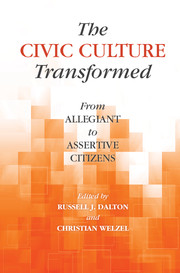Book contents
- Frontmatter
- Dedication
- Contents
- List of Figures
- List of Tables
- Contributors
- Foreword
- Preface and Acknowledgments
- 1 Political Culture and Value Change
- Part A Changing Values
- 2 Value Change over a Third of a Century
- 3 The Decline of Deference Revisited
- 4 Enlightening People
- Part B Changing Images of Government
- Part C The Impact of Cultural Change
- References
- Index
4 - Enlightening People
The Spark of Emancipative Values1
Published online by Cambridge University Press: 05 January 2015
- Frontmatter
- Dedication
- Contents
- List of Figures
- List of Tables
- Contributors
- Foreword
- Preface and Acknowledgments
- 1 Political Culture and Value Change
- Part A Changing Values
- 2 Value Change over a Third of a Century
- 3 The Decline of Deference Revisited
- 4 Enlightening People
- Part B Changing Images of Government
- Part C The Impact of Cultural Change
- References
- Index
Summary
Based on evidence from fifty societies around the world, this chapter examines the impact of value orientations on three distinct aspects of how people view democracy: the strength of their desires for democracy, the liberalness of their notions of democracy, and the criticalness of their assessments of democracy. We focus on the ways in which “emancipative values” shape people’s views of democracy because these are the values that give rise to an assertive political culture – the theme of this book.
We find that emancipative values transform people’s desires for democracy profoundly and in a uniform fashion across global cultural zones. This emancipatory transformation can be characterized as an “enlightenment effect” in a double way. For it couples people’s democratic desires with (1) a more liberal understanding of what democracy means and (2) a more critical assessment of how democratic their society actually is. The emancipatory transformation originates in the cognitive mobilization of wide population segments. And its enlightenment effect unfolds independent of whether a society has a long, short, or no democratic tradition. Moreover, the emancipatory transformation has far-reaching consequences: Where it does not happen, even widespread desires for democracy coexist easily with deficient or absent democracy. In these cases, people’s democratic desires lack the enlightening spark that emancipative values infuse.
- Type
- Chapter
- Information
- The Civic Culture TransformedFrom Allegiant to Assertive Citizens, pp. 59 - 88Publisher: Cambridge University PressPrint publication year: 2014
- 32
- Cited by

